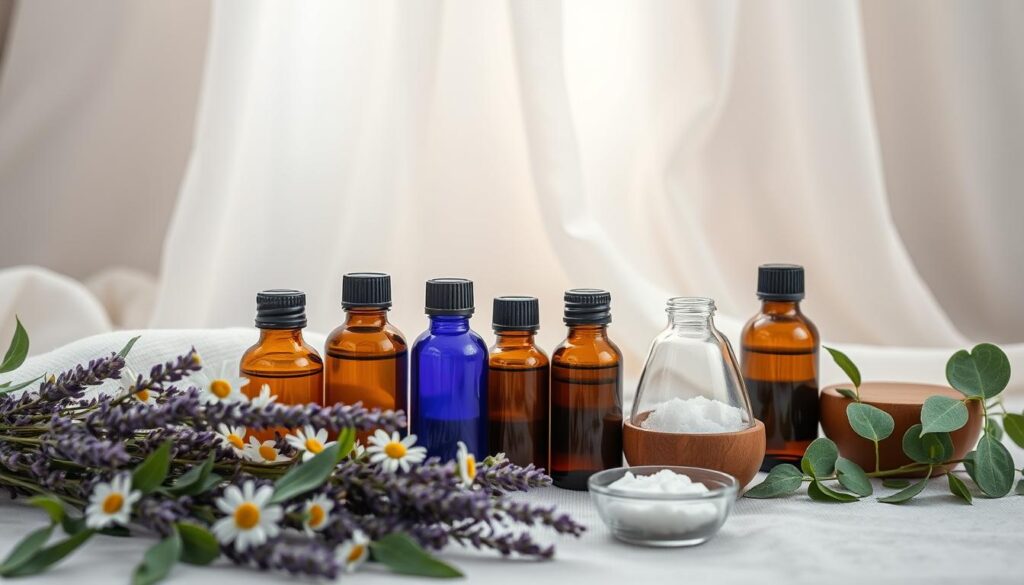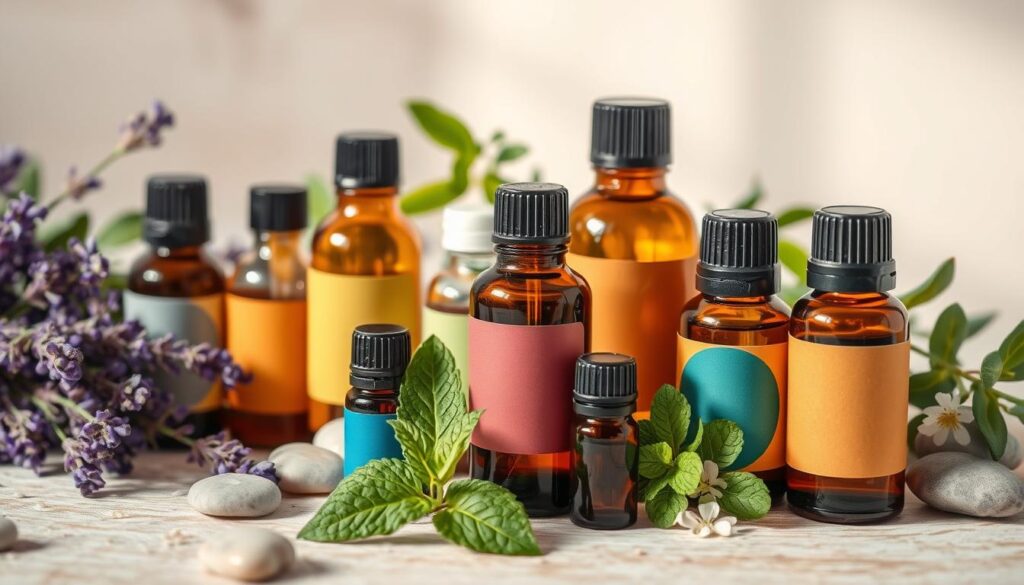Essential Oil Benefits for Natural Health and Wellness
Did you know that over 200 unique compounds can be found in essential oils? This variety comes from the many plant species used to make them. Essential oils are key in aromatherapy and wellness, offering benefits like stress relief and fighting germs.
Essential oils are very concentrated and come from plants through distillation or other methods. Each oil has its own scent and health benefits. With over 90 types of essential oils, you can find many options for your wellness.
Essential oils work by interacting with your body. When you breathe them in or apply them to your skin, they can affect your mood and body functions. This is the science behind aromatherapy.
Scientists are still learning about essential oils. A recent search found 107 studies on oils from plants like lemon and cinnamon. These studies look at how oils fight germs, reduce inflammation, and help with health issues.
Table of Contents
Understanding Essential Oils: Nature’s Powerful Extracts
Essential oils are nature’s concentrated botanical oils. They are known for their unique fragrances and health benefits. Unlike synthetic fragrances, they keep the plant’s original chemistry and strength.
What Makes Essential Oils Unique
Essential oils are special because of their complex chemical makeup. They have hundreds of compounds, like terpenes and esters. This mix gives each oil its unique smell and health benefits.
Extraction Methods and Quality Standards
Getting essential oils right is key. There are careful methods to keep their good stuff intact. These include:
- Steam distillation
- Cold pressing
- Water distillation
Quality matters a lot in the essential oil world. Good suppliers are open, test their oils, and sell them in dark glass bottles without extra stuff.
Chemical Composition and Active Compounds
The health benefits of essential oils come from their special mix of chemicals. This mix changes based on the plant, where it grows, and how it’s made. Knowing this helps use their benefits in natural health and wellness.
| Essential Oil | Key Compounds | Main Benefits |
|---|---|---|
| Lavender | Linalool, Linalyl acetate | Stress relief, sleep support |
| Peppermint | Menthol, Menthone | Energy boost, concentration |
| Eucalyptus | Eucalyptol | Respiratory support, antiviral |
Learning about essential oils helps you use them wisely in your health routine. It shows their importance in natural health.
The Science Behind Essential Oil Benefits
Essential oils have been popular for a long time. They offer health benefits because of their special chemical makeup. These oils come from plants and contain compounds like terpenes and esters.
Each essential oil has its own effects. This makes them great for those who like natural remedies.
How Essential Oils Interact with the Body
Essential oils work on your body and mind through smell. When you breathe them in, they reach your brain. For example, lavender oil can help calm you down by affecting your brain’s chemicals.
Peppermint oil, on the other hand, can make you feel more alert. It does this by stimulating your nervous system.
The Role of the Limbic System
The limbic system is key in how essential oils affect us. It’s part of the brain that handles emotions and memories. Aromas from essential oils, like bergamot, can even help protect your brain and improve your memory.
Absorption Methods and Effectiveness
Essential oils can be used in two main ways: by inhaling them or applying them to your skin. When you put them on your skin, they can help with pain, inflammation, or even fight off germs. Tea tree oil, for example, is good for acne and fungal infections because of its antibacterial properties.
- Inhalation: Stimulates olfactory receptors
- Topical: Absorbed through the skin
- Oral: Not recommended without professional guidance
The success of naturalpurecare products depends on how you use them and how your body reacts. Essential oils are a natural way to take care of yourself. But, it’s important to use them wisely and talk to experts for the best advice.
Top Essential Oils for Therapeutic Use
Essential oils are great for natural health and wellness. Let’s look at some popular oils and their uses.
Lavender essential oil is known for its calming effects. It helps with stress and sleep. You can use it in diffusers or apply it on your skin when mixed with a carrier oil.
Peppermint essential oil has many benefits. It boosts energy and helps with digestion. It’s also good for headaches and muscle pain. The cool feeling of peppermint oil can wake you up when you inhale it.
Lemongrass essential oil has a fresh scent and can lift your mood. It’s used in aromatherapy to feel more energized. Some people also use it on their skin for muscle relief.
| Essential Oil | Key Benefits | Common Uses |
|---|---|---|
| Lavender | Stress relief, sleep improvement | Diffusion, topical application |
| Peppermint | Energy boost, digestive aid | Inhalation, diluted topical use |
| Lemongrass | Mood enhancement, muscle relief | Aromatherapy, diluted massage |
| Tea Tree | Immune support, skin health | Topical application, cleaning |
| Eucalyptus | Respiratory health, sinus relief | Steam inhalation, diffusion |
Always use essential oils safely. The USDA certified organic Perfect 10 Essential Oil Set is a good choice. It costs $24.99 and has many oils for wellness. Remember, these oils are for external use only. The FDA hasn’t evaluated their health claims.
Stress Relief and Emotional Wellness Benefits

Essential oils are great for reducing stress and improving emotional health. The demand for these natural oils is growing fast. This shows how much people value using aromatherapy for their mental well-being.
Anxiety and Mood Enhancement
Lavender essential oil is known for its ability to lower anxiety. Research shows it helps people feel calmer before medical procedures. Bergamot oil can also help by reducing stress hormones and improving mood.
Ylang ylang essential oil is said to boost self-confidence. However, its effect on anxiety is not as well-studied.
Sleep Support and Relaxation
Aromatherapy has been shown to improve sleep quality. Lavender oil is especially effective in reducing stress and helping people sleep better, even in hospitals. Other oils like chamomile and clary sage can also help you relax and sleep well.
Mental Clarity and Focus
Some essential oils can help improve your mental focus. Peppermint and rosemary oils are known to enhance mental clarity. Lemon oil may also help reduce anxiety in students, making it easier to concentrate during stressful times.
| Essential Oil | Primary Benefit | Study Finding |
|---|---|---|
| Lavender | Anxiety Reduction | Effective before surgery and in ICUs |
| Bergamot | Mood Enhancement | Reduced anxiety behaviors in animal studies |
| Ylang Ylang | Self-Esteem Boost | Improved self-esteem in small study |
| Lemon | Anxiety Management | Reduced test anxiety in nursing students |
While the research is promising, it’s important to use essential oils safely. Always dilute them correctly and talk to a professional if you have health concerns. With proper use, these natural oils can be great for your emotional well-being.
Physical Health Applications and Benefits
Essential oils are natural remedies for physical health issues. They are plant extracts that are popular in alternative medicine. They help with headaches, digestive problems, and more.
Peppermint oil is very useful. It helps with headaches and nausea. It also helps with muscle pain and menstrual cramps. Ginger oil helps with digestive issues.
Tea tree oil is great for skin. It fights skin infections because of its antifungal properties. It’s a natural way to handle common skin problems.
- Lavender: Improves sleep quality
- Eucalyptus: Provides pain relief
- Frankincense: Supports skin health
Research is ongoing on essential oils and heart health and chronic conditions. The results are promising, but more studies are needed.
“Essential oils offer a natural approach to supporting physical health, but it’s important to use them safely and consult with healthcare providers.”
Quality is key. Choose pure essential oils from trusted sources. Use them correctly to get the most benefits.https://www.naturalpurecare.com/selenite-crystal/
Anti-inflammatory and Pain Management Properties

Essential oils are powerful natural remedies for pain and inflammation. They have therapeutic properties that help ease discomfort and aid in healing. Studies have shown that different essential oils can manage inflammation and pain well.
Natural Pain Relief Solutions
Lavender and peppermint oils are strong pain relievers. A 2016 study found that peppermint oil greatly reduces itchiness, making it great for skin inflammation. Lavender oil’s antibacterial and anti-inflammatory properties, confirmed in a 2002 review, make it useful for pain management.
Inflammation Reduction Techniques
Eucalyptus and cumin oils are promising for treating inflammation. Research in 2021 showed eucalyptus oil’s potential in managing muscular dystrophy and rheumatoid arthritis. A 2024 study suggested cumin oil’s effectiveness, but more research is needed.
Joint and Muscle Support
Ginger and spruce oils are excellent for joint and muscle support. Ginger oil is being studied for its antioxidant properties in treating stiff joints and sore muscles. A 2015 study found that boreal plants like spruce can help reduce joint stiffness and muscle soreness.
While essential oils offer natural solutions for pain and inflammation, it’s important to use them safely. The American Lung Association warns that prolonged exposure may worsen existing health issues. Always talk to a healthcare professional before adding essential oils to your wellness routine.
Antimicrobial and Immune System Support
Essential oils are powerful natural remedies for boosting your immune system and fighting harmful microbes. They are valuable additions to your wellness routine. Let’s explore how certain oils can support your body’s defenses and promote overall health.
Research shows that essential oils can balance immune responses and reduce inflammation. For example, eucalyptus oil enhances phagocytosis and decreases inflammatory cytokines in immune cells. Clove oil also lowers inflammation by reducing cytokines in macrophages.
Lavender oil, when massaged into the skin, increases immune function markers. Tea tree oil affects inflammatory cytokine production in concentrated solutions. These findings highlight the potential of essential oils as natural remedies for immune support.
Oregano oil stands out for its antimicrobial properties. It contains compounds like thymol and carvacrol that exhibit strong activity against bacteria. This makes it a promising alternative in the face of growing antibiotic resistance.
| Essential Oil | Immune Support Benefit |
|---|---|
| Eucalyptus | Enhances phagocytosis, reduces inflammatory cytokines |
| Clove | Lowers inflammation, reduces cytokines in macrophages |
| Lavender | Increases immune function markers when massaged |
| Tea Tree | Affects inflammatory cytokine production |
| Oregano | Contains antimicrobial compounds (thymol, carvacrol) |
By incorporating these essential oils into your naturalpurecare routine, you can harness their therapeutic properties. They support your immune system and fight off harmful microbes naturally. Remember to use them properly and consult with a healthcare professional for personalized advice.
Safe Usage Guidelines and Best Practices
Essential oils are strong plant extracts used in naturalcare and organic skincare. To use them safely, it’s important to follow certain guidelines. This section will cover key practices for using essential oils in aromatherapy and skincare routines.
Proper Dilution Methods
Diluting essential oils is key to avoid skin irritation. A safe amount is usually under 5%. For a 1% dilution, mix 6 drops of essential oil with 1 ounce of carrier oil. Some oils, like cinnamon and clove, always need dilution.
| Dilution % | Drops of Essential Oil | Carrier Oil Amount |
|---|---|---|
| 1% | 6 drops | 1 ounce |
| 2% | 12 drops | 1 ounce |
| 3% | 18 drops | 1 ounce |
Application Techniques
Common methods include diffusion, topical application, and inhalation. For skin use, always do a patch test first. Some oils can cause photosensitivity, so avoid sun exposure after use. Internal use is not recommended without professional guidance.
Storage and Handling
Keep essential oils in dark glass bottles in a cool, dry place. This keeps them potent for organic skincare use. Store them out of reach of children and pets. Some oils, like eucalyptus, can be harmful if misused, especially for kids.
“Essential oils are potent natural extracts. Use them wisely and safely to enhance your wellness journey.”
Remember, while essential oils offer many benefits in naturalcare, they require careful handling. Always consult a healthcare provider before use, particularly if pregnant or on medication.
Essential Oil Blending for Enhanced Benefits
Blending essential oils can boost their benefits and create unique scents. You can make natural remedies that fit your needs. Let’s dive into the art of blending essential oils and how it can improve your wellness.
When blending, follow the 30-50-20 rule. Use 30% base note, 50% middle note, and 20% top note for a 10ml bottle. This mix ensures a balanced scent. Let your blend sit for at least 24 hours before using it for the best results.
Essential oils have different benefits, like reducing inflammation or helping you relax. Mixing oils with similar benefits can tackle several issues at once. For example, lavender and chamomile together can help you relax and sleep better.
It’s important to blend essential oils safely. Always mix them with carrier oils like coconut or jojoba to avoid skin irritation. Use only high-quality, pure, and organic oils to get the most benefits and avoid harm from synthetic oils.
| Blending Purpose | Recommended Oils | Benefits |
|---|---|---|
| Stress Relief | Lavender, Bergamot, Ylang-ylang | Reduces anxiety, promotes relaxation |
| Energy Boost | Peppermint, Lemon, Rosemary | Increases alertness, improves focus |
| Immune Support | Tea Tree, Eucalyptus, Frankincense | Strengthens immune system, fights infections |
Start with a 1-3% dilution ratio when you begin blending. This way, you can enjoy the oils’ benefits while avoiding any bad reactions. Always do a patch test before using a new blend on your skin.
“Essential oil blending is an art that combines science and intuition to create powerful natural remedies tailored to individual needs.”
Learning to blend essential oils opens up a world of possibilities. It can greatly enhance your aromatherapy experience.
Enriching Baby Care with Natural Remedies
In addition to providing the best diapers for your baby, many parents also seek natural solutions for overall wellness. Essential oils are highly concentrated and can be a beneficial addition to your baby care routine. However, when it comes to applying essential oils for babies, it is important to dilute them with a base oil such as coconut or jojoba oil to avoid skin irritation. Popular essential oils like lavender, chamomile, and tea tree oil can have calming effects, making them perfect for creating a soothing environment for your baby. When used safely, essential oils can help calm fussy babies, promote relaxation, and even improve sleep.
While essential oils may be popular for adults, they also have other health benefits that might interest parents. For example, some essential oils have anti-inflammatory effects, which can be helpful in reducing inflammation from minor skin irritations. Additionally, certain oils may have a positive impact on conditions like irritable bowel syndrome (IBS) or even help promote blood pressure regulation for parents looking to maintain their own wellness while managing the stress of caring for a newborn.
By combining the comfort of Coterie Diapers with safe, natural remedies like essential oils, you can create a nurturing and soothing environment for both you and your baby.
Conclusion
Essential oils are powerful natural remedies with many wellness benefits. They help with stress and physical health, thanks to their concentrated plant extracts. When using essential oils, it’s important to do so with care and knowledge.
Making essential oils is a big task. For example, it takes 220 pounds of lavender flowers to make one pound of lavender oil. Rose oil requires up to 10,000 pounds of rose petals. This shows why we need to choose oils that are organic, fair trade, and sustainably sourced.
Studies have found that essential oils can fight off germs and reduce inflammation. Tea tree, oregano, and lavender oils are good against many pathogens. Peppermint and eucalyptus oils might help with pain. As more research comes in, we’ll learn more about how these oils can help us stay healthy.
FAQ
What are essential oils?
How do essential oils work in the body?
What are some popular therapeutic essential oils?
Can essential oils help with stress and anxiety?
Are essential oils effective for pain management?
Do essential oils have antimicrobial properties?
How should essential oils be safely used?
Can essential oils be blended for enhanced benefits?
What makes essential oils unique compared to other plant extracts?
Are there any risks associated with using essential oils?
Source Links
- Essential oils: a systematic review on revolutionizing health, nutrition, and omics for optimal well-being – https://pmc.ncbi.nlm.nih.gov/articles/PMC10905622/
- What Are Essential Oils, and Do They Work? – https://www.healthline.com/nutrition/what-are-essential-oils
- Essential Oils 101: Unlocking the Power of Nature’s Remedies – https://www.hightechhealth.com/essential-oils-101/
- Understanding Chemotypes for Essential Oil Safety – https://aromahead.com/blog/understanding-chemotypes-in-aromatherapy-the-key-to-safe-and-effective-essential-oil-use?srsltid=AfmBOorEoNYFHKsyQVyzuVWV2BEV7k9FtqPwZfafPB2qRXLEGZ9A8MmX
- The Healing Power of Essential Oils: Aromatherapy Explained – https://medium.com/@ruchirathor_23436/the-healing-power-of-essential-oils-aromatherapy-explained-373e6d32f071
- The Science Behind Aromatherapy: How Essential Oils Work on the Body and Mind – https://essencering.com/blogs/articles/the-science-behind-aromatherapy-how-essential-oils-work-on-the-body-and-mind?srsltid=AfmBOopRqljpVGZIDqr2pDlUEAWmmuP3SxOSyjbDkeRNgFg957-FrDi7
- Enhance Your Study Sessions: The Science Behind Essential Oils and Aromatherapy for Improved Focus and Memory – https://www.shopascents.com/blogs/news/enhance-your-study-sessions-the-science-behind-essential-oils-and-aromatherapy-for-improved-focus-and-memory?srsltid=AfmBOoo3KBdNxN53sTjbj3C9KxPGerrj9eQ79r2qkH6DGAwCfpcEW2oS
- Perfect 10 Essential Oil Set – USDA Organic, 100% Pure, Natural, Therapeutic Grade 10 ml – https://purador.com/products/10ml-essential-oil-set-usda-organic-100-pure-natural-therapeutic-grade
- Top 6 Organic Singles Essential Oil Set – https://www.planttherapy.com/products/top-6-organic-singles-essential-oil-set
- Can Aromatherapy With Essential Oils Provide Stress Relief? – https://health.clevelandclinic.org/stressed-out-aromatherapy-can-help-you-to-feel-calmer
- Aromatherapy and Essential Oils: Making Sense of Scents – https://www.rn.com/blog/clinical-insights/aromatherapy-and-essential-oils-making-sense-of-scents/
- Best essential oils for relieving anxiety – https://www.medicalnewstoday.com/articles/324478
- Health Benefits of Essential Oils in Your Bath – https://www.webmd.com/beauty/health-benefits-essential-oils-bath
- Aromatherapy: Essential Oils to Support Your Health – https://www.nhpcanada.org/NHPC-Blog/Aromatherapy–Essential-Oils-to-Support-Your-Health
- What Is Aromatherapy and How Does It Help Me? – https://www.healthline.com/health/what-is-aromatherapy
- Essential Oils for Inflammation: Do They Work? – https://www.healthline.com/health/essential-oils-for-inflammation
- Top 10 Essential Oils For Inflammation – https://www.edensgarden.com/blogs/news/top-10-essential-oils-for-inflammation?srsltid=AfmBOopd872ElhgwJWifIt7GChn8cLhJfopNjknzAKHG-8otBYPyr158
- How to Use Essential Oils to Boost the Immune System – https://nikura.com/blogs/discover/using-essential-oils-to-boost-the-immune-system
- Use of Essential Oils to Counteract the Phenomena of Antimicrobial Resistance in Livestock Species – https://pmc.ncbi.nlm.nih.gov/articles/PMC10885947/
- Are Essential Oils Safe? 13 Things to Know Before Use – https://www.healthline.com/health/are-essential-oils-safe
- Essential Oil Safety: Avoiding Top 3 Mistakes in Usage (July 2024) – https://info.achs.edu/blog/aromatherapy-essential-oil-dangers-and-safety
- Essential Oil Blends: How to Get the Most Out of Aromatherapy – https://infraredsauna.com/blog/best-essential-oil-blends/
- The Ultimate Guide to Essential Oil Blending for Beginners – Pure Natural Essential Oil, Manufacturer, Wholesaler & Supplier in India- Kanha Nature Oils – https://kanhanatureoils.com/blog/the-ultimate-guide-to-essential-oil-blending-for-beginners/?srsltid=AfmBOorzqpQlKi4F7fWzkgzj_Z6kqcj7E9NWoN5SLbm8oIEwtJv8F5hI
- The Environmental Impact of Essential Oils: A Closer Look – https://floralessentialoils.com/blog/the-environmental-impact-of-essential-oils-a-closer-look/
- Best practices for choosing and using essential oils – https://landema.com/en-us/blog/choose-and-use-essential-oils-responsibly?srsltid=AfmBOoq3xymTKnlAn05fvMixAvUUREtIlIsZJibDn5suCsXyOp68nmRV
- Essential Oils and Their Bioactive Molecules: Recent Advances and New Applications – https://www.intechopen.com/chapters/88578








2 Comments
Comments are closed.